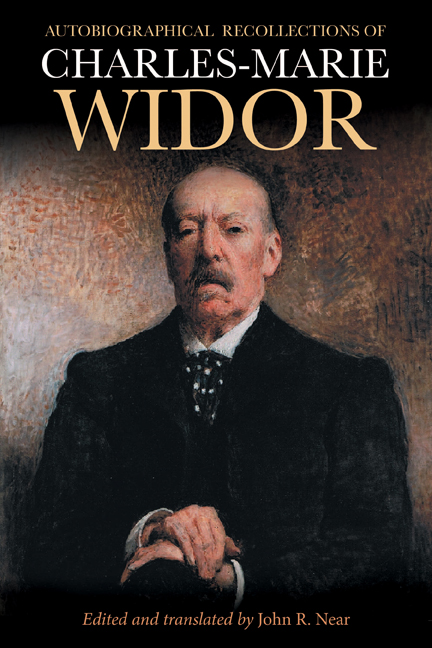Book contents
- Frontmatter
- Contents
- List of Illustrations
- Foreword
- Preface
- Acknowledgments
- Introduction: Tribute to Charles-Marie Widor
- Part One Studies, Early Performances, and Aristide Cavaillé-Coll (1844–69)
- Part Two La Belle Époque: The Franco-Prussian War to The Great War (1870–1914)
- Part Three The Great War and Important Initiatives (1914–37)
- Appendix 1 Birth record of Charles-Marie Widor, 1844
- Appendix 2 Widor’s Diplôme de Bachelier ès Lettres, 1863
- Appendix 3 Widor’s letter of appreciation to Jacques Lemmens, 1863
- Appendix 4 Brussels Ducal Palace organ specification, 1861
- Appendix 5 Widor’s certificate for Chevalier de l’Ordre du Christ, 1866
- Appendix 6 “To Budapest,” 1893
- Appendix 7 Widor’s travels to Russia and his 1903 passport
- Appendix 8 Widor’s list of his works in 1894
- Appendix 9 The Paris Conservatory organs, 1872
- Appendix 10 Chronique [Widor’s appeal for an organ hall at the Paris Conservatory, 1895]
- Appendix 11 Widor’s certificate for the Académie Royale, Brussels, 1908
- Appendix 12 “Debussy & Rodin,” 1927
- Appendix 13 The American Conservatory organ, Fontainebleau, 1925
- Appendix 14 Letters concerning the Trocadéro organ restoration, 1926
- Notes
- Bibliography
- Index
- Eastman Studies in Music
4 - 1866–69: Organ inaugurations: Kensington, Notre-Dame de Paris, La Trinité
Published online by Cambridge University Press: 09 May 2024
- Frontmatter
- Contents
- List of Illustrations
- Foreword
- Preface
- Acknowledgments
- Introduction: Tribute to Charles-Marie Widor
- Part One Studies, Early Performances, and Aristide Cavaillé-Coll (1844–69)
- Part Two La Belle Époque: The Franco-Prussian War to The Great War (1870–1914)
- Part Three The Great War and Important Initiatives (1914–37)
- Appendix 1 Birth record of Charles-Marie Widor, 1844
- Appendix 2 Widor’s Diplôme de Bachelier ès Lettres, 1863
- Appendix 3 Widor’s letter of appreciation to Jacques Lemmens, 1863
- Appendix 4 Brussels Ducal Palace organ specification, 1861
- Appendix 5 Widor’s certificate for Chevalier de l’Ordre du Christ, 1866
- Appendix 6 “To Budapest,” 1893
- Appendix 7 Widor’s travels to Russia and his 1903 passport
- Appendix 8 Widor’s list of his works in 1894
- Appendix 9 The Paris Conservatory organs, 1872
- Appendix 10 Chronique [Widor’s appeal for an organ hall at the Paris Conservatory, 1895]
- Appendix 11 Widor’s certificate for the Académie Royale, Brussels, 1908
- Appendix 12 “Debussy & Rodin,” 1927
- Appendix 13 The American Conservatory organ, Fontainebleau, 1925
- Appendix 14 Letters concerning the Trocadéro organ restoration, 1926
- Notes
- Bibliography
- Index
- Eastman Studies in Music
Summary
A few months later, Cavaillé-Coll took me to England to inaugurate the Carmelite organ in Kensington, a heartbreaking memory—the Battle of Sadowa was being fought while I was playing.
In 1867, my faithful patron (Cavaillé) who had just built a small organ of twenty-eight stops—a real gem—next to which was an Érard piano, asked me to come on two separate occasions to spend a month in Paris to give a daily concert. These concerts gradually became very popular. It was at that time that I wrote my Six duos for Piano and Organ, and that I became somewhat of a Parisian, acquiring a certain notoriety, thanks to Cavaillé. In fact, at the same time, he had me play on the Louvre Mondays at the home of Émilien de Nieuwerkerke, Superintendent of Fine Arts, who lived above the Passage Marengo. All the artists of Paris came there. I played my Duos with pianist Alexis-Henri Fissot. The work was very successful and much applauded. Unfortunately, these Duos never brought me a penny. I had them published by [Prévost], who was choirmaster at Saint-Sulpice; but he had no faith in me, and I made a foolish deal with him. Several years later, I was quite surprised when, at the sale of a music business, publisher Henri Heugel told me that he had just paid seventeen thousand francs for the rights to these Duos. I was certainly flattered, but a little upset that I hadn't had a penny of it.
In 1868, the solemn inauguration of the grand orgue of Notre-Dame de Paris took place. I was called upon to perform with Saint-Saëns and Guilmant. I confess that I was very bad. I had wanted to compose a sensational piece for this occasion, but at the last moment I found it so devoid of interest that I naively gave in to doing an improvisation that seemed to me quite ordinary. That did not discourage the builder, and the following Sunday, having asked me to come and play the instrument again, he brought along Charles Gounod who encouraged me and never stopped encouraging me from then on.
In Lyon, between my engagement in Portugal and my appointment at Saint-Sulpice, I embarked on a work in classical style, a Quintet for Piano and String Quartet [op. 7, 1868]. I took the liberty of dedicating it to Gounod who kindly accepted the dedication.
- Type
- Chapter
- Information
- Autobiographical Recollections of Charles-Marie Widor , pp. 11 - 12Publisher: Boydell & BrewerPrint publication year: 2024

